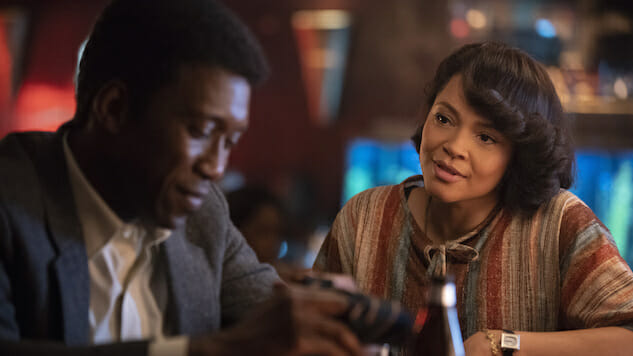True Detective Deepens the Mystery in “Kiss Tomorrow Goodbye”
(Episode 3.02)
Photo: Warrick Page/HBO
Indulge me for a second, would you? I might dwell on title sequences more than is strictly necessary, but honestly, I think they’re an underappreciated art form and that good ones don’t get the credit they’re due, just as terrible ones are under-examined in their ability to undermine credibility and make audiences impatient. True Detective has an excellent one, with brooding, symbolically freighted images that perfectly underline the mood of the series, cloudscapes dissolving into neocorices, full moons reflecting unblinking eyes. Not to mention the smoldering T-Bone Burnett score. Bravo.
Did the police capture all the relevant evidence from that cave in Devil’s Den? What’s the story with the creepy corn-husk dolls? In 1990, the deposition is getting on Hays’ (Mahershala Ali) last nerve: He wants to know what they’ve found out, whether they’ve found Julie Purcell after all this time, whether she was involved in a robbery. He wants closure on this case. It doesn’t look as if he’s going to get it. In 1980, he and West (Stephen Dorff) question trash-picker Brett Woodard (Michael Greyeyes), who saw the Purcell kids riding their bikes the evening they vanished. Woodard’s doing to Hays what Hays is doing in 1990: Questioning the questioner. He wants to connect, as a fellow vet. He’s not a burnout, he wants the cops to know. His wife left, the war never completely ended, he can’t quite keep it together but he tries. (“You ever been someplace you couldn’t leave?” he asks Hays, “And you couldn’t stay both at the same time?” The look in Hays’ eyes suggests he is in such a place all the time.)
In 2015, Hays and his son, Henry (Ray Fisher, who really does look eerily like he could be related to Carmen Ejogo), are revisiting salient locations from back in 1980. Henry isn’t sure it’s all that helpful, but Hays seems to want to remember. He also wants to keep going through his painful conversation with the documentary filmmaker, revealing that it’s because he wants to find out what she knows about the case, what new information she might have. Most of the scenes in the second episode follow the two-character investigative dialogue mode, and most of those conversations have a strange way of flipping our perceptions of who’s getting information from whom. (“I’m interested in the intersectionality of marginalized groups within authoritarian and systemic racist structures,” the documentarian says with a toothy smile. The Hays men look utterly exhausted in response.)
Amelia (Carmen Ejogo) unofficially begins to assist the investigation by asking her students about the creepy dolls. One kid says they were being passed out at Halloween. Hays comes to a bar where she’s having a drink with friends, and they do a kind of voluntary self-deposition. She’s local, dropped out of college and went to San Francisco, got mixed up with the Panthers, came home and finished her degree; he’s descended from ag workers and was told he was “dumb” as a kid because he was dyslexic. She’s a vegetarian. (“If you’re a Democrat, don’t tell me,” he replies.) They bond over not wanting to get married and other “crazy” ideations. The candor is positive, it feels good. Then the bar TV starts broadcasting a press conference about the Purcell case. Hays appreciates the prosecutor’s honesty considerably less, as it predictably starts a mass panic and a glut of phony leads.
-

-

-

-

-

-

-

-

-

-

-

-

-

-

-

-

-

-

-

-

-

-

-

-

-

-

-

-

-

-

-

-

-

-

-

-

-

-

-

-








































